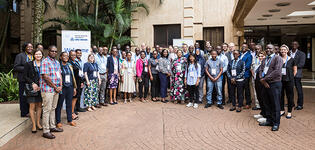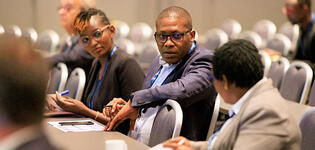Blog
Oslo conference turns the spotlight on sustainable development financing
With the deadline for achieving the UN’s Sustainable Development Goals just seven years away, there is an increasing sense of urgency over the question of how to finance the ambitious framework, particularly in lower- and middle-income countries.
Experts met at the recent WIDER Development Conference to discuss solutions during the plenary session on Financing sustainable development. The conference took place online and in Oslo, Norway from 6–8 September 2023.
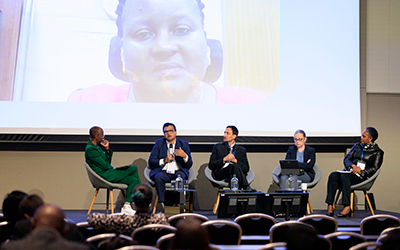
Professor Dan Banik of the University of Oslo’s Centre for Development and the Environment suggested a paradigm shift from a charity and donation framework to investing in a common future.
‘The expert group for recommendations on financing for Sustainable Development Goals, of which I have been a member, wants to use the concept of investments. We would like donors to revisit their portfolio and think about clear targets, and to focus on impact, effectiveness, evaluations’, he added.
Emilia Skrok from the World Bank Group called for new ways to involve the private sector in mobilizing domestic revenues, but she pointed out that some progress was made, even during difficult times.
‘Despite the recent drop of economic growth by 10% in many countries we see 20-30 countries every year making an effort, by being able to increase the amount of tax to GDP by around 0.5% of GDP.’
Joining remotely from Kampala, Milly Nalukwago, Assistant Research Commissioner at the Bank of Uganda noted that sub-Saharan developing economies benefit from development financing, but it was time for governments in the region to step up their game. She highlighted recent gains in Uganda.
‘We have grown the taxpayer register from 1.3 million to 2.1 million, so adding 800,000 taxpayers to the register within six months. We are putting in place easy ways for paying taxes and we are educating citizens, so that our reliance on external aid is reduced’, Nalukwago explained.
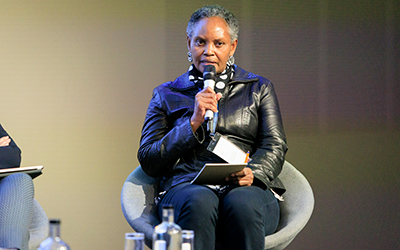
Rose Ngugi, Executive Director of the Kenya Institute for Public Policy Research and Analysis (KIPPRA), emphasized the role of savings and investment as a means of job creation in the private sector. All the same, she reminded that high levels of informality can stymie development.
‘At the end of the day it is about asking how we can create an environment that supports informal workers to do their small savings. Even if it is a dollar per day.’
Peter Chowla, Economic Affairs Officer with the UN’s Department of Social and Economic Affairs, concluded that governments should aim for simultaneous progress domestically as well as internationally.
‘The positive note is that there are opportunities to do more and work together, specifically in the international environment. Discussions in the UN General Assembly will be on how to take forward tax cooperation. We will also have the Summit of the Future next year, and, most probably a fourth international conference on financing for development in 2025.’
Tax authority research collaboration to power resource mobilization
The focus on domestic revenue mobilization continued with a panel on how countries in sub-Saharan Africa are collaborating on tax authority research. UNU-WIDER Non-Resident Senior Research Fellow Jukka Pirttilä set the stage by outlining how the institute helps authorities understand taxpayer behavior and deter tax avoidance and evasion.
Waziona Ligomeka, Director for Policy Planning and Research of the Malawi Revenue Authority said that collaboration helps supplement the country’s research capacity and adds to the robustness of research output, which in turn helps develop policies that close gaps in tax collection. For example, according to Ligomeka there is still room for research to improve value-added tax collections in Malawi.
'The VAT collection efficiency for Malawi is at 14%, for other countries as much as 50%, and for African countries on average around 30%. There is potential to collect more revenues from VAT. So I would want more of this research.'
Meanwhile Allen Nassanga, Research & Innovation Assistant Commissioner at the Uganda Revenue Authority stressed the value of collaboration by regional tax authorities as well as inter-governmental agencies, and praised the use of tax-benefit microsimulation models, such as SOUTHMOD.
'I think it's such a great example of where one can use the confidential data that sits in the research lab or at the revenue authority, but it can be translated into an Excel-based model that can be distributed broadly. There are these wonderful examples now across sub-Saharan Africa.'
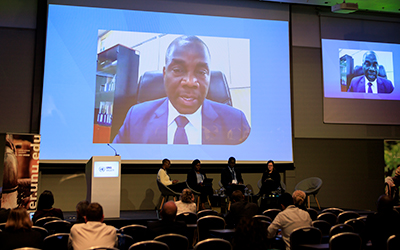
Ezekiel Phiri, Director for Research & Corporate Strategy of the Zambia Revenue Authority noted that technological advancement offers an opportunity to match data from different sources. However, he cautioned that it is also important to have robust data governance systems in place.
'Emerging technologies like AI come in handy for analyzing information. But it also creates challenges in terms of the governance framework around all this', he explained.
Concluding the discussion, Ingrid Woolard, Professor and Dean of the Faculty of Economic and Management Sciences at South Africa’s Stellenbosch University, echoed Phiri’s concern about ensuring appropriate governance for processing data.
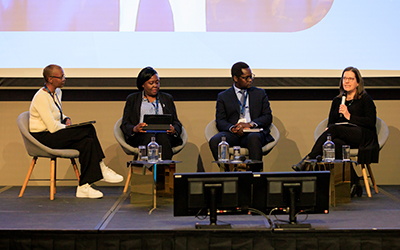
'The revenue authorities have rightly been cautious about the ways to use and manage highly sensitive data', Woolard commented.
As the global community inches closer to 2030, panelists agreed that it is increasingly important to find a balance among different forms of financing for the ambitious programmes, particularly in an environment where many low-income countries are facing budget deficits. Addressing that challenge will require committed efforts from governments and tax authorities.
Work is also needed to cement a social contract that encourages households to willingly pay taxes, and for authorities and policymakers to build transparent and accountable systems that earn the trust of taxpayers.
Denise Wall is a journalist who has spent nearly 25 years working in print, radio, television and online news and podcasts. She moderated two panel discussions at the WIDER Development Conference 2023.
The views expressed in this piece are those of the author(s), and do not necessarily reflect the views of the Institute or the United Nations University, nor the programme/project donors.
 Join the network
Join the network
